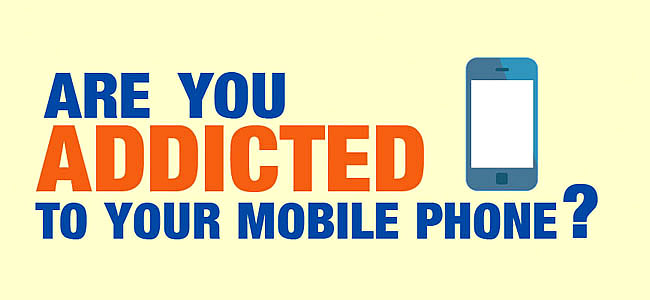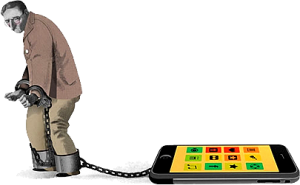Happy Dhanteras
Dhanteras also known as the festival of...

More and more people are losing themselves to the virtual world, spending hours on social media and web chats-
(Article compiled from ‘India Today’ Magazine 28th September 2015, Page No- 24 to 31)
When gadgets become the focal point of one’s life, eating into work, family life, friendships and leisure, it’s an ‘addiction‘, just like any other addiction.
 If holding a gadget makes you excited and the absence of it makes you miserable, it’s time to call on the counselor to check for addiction.
If holding a gadget makes you excited and the absence of it makes you miserable, it’s time to call on the counselor to check for addiction.Excessive use of the internet by young people that takes them away from the “real” world for many more hours than experts consider healthy is a serious concern around the world. China is the first country to treat internet addiction as a clinical disorder. Web Junkie, is a documentary on a Beijing rehab center where teenagers are confined for months and put through draconian “deprogramming” therapy.
A 24 year old, Mumbai-based lawyer was told that she has selfies or self-obsessed narcissism when she spent hours locked in her bedroom clicking and posting 50 selfies a day. It was only when she was asked to resign from work for poor attendance that her parents took her to a counselor. “I get a high when I get lots of likes for my pictures. I work out hard to maintain my body,” she says. During counseling, she realized that her obsession stemmed from a poor body image that she had suffered from since childhood.
One gets a sense of thrill each time he forwards a message on WhatsApp.
People feel important when others appreciate them for sharing news, whether or not it’s true or worthwhile,” says a psychotherapist.
 Addiction to online gaming, or Internet Gaming Syndrome, is another area of concern. An engineering student walked into a Mumbai psychiatrist’s chamber two years ago, asking for help to wean him off games. He was a bright student, but was sent on long leave by the United States University because he spent 50 hours at a stretch playing games.
Addiction to online gaming, or Internet Gaming Syndrome, is another area of concern. An engineering student walked into a Mumbai psychiatrist’s chamber two years ago, asking for help to wean him off games. He was a bright student, but was sent on long leave by the United States University because he spent 50 hours at a stretch playing games.
Digital addicts are put on a diet of Ludo and tennis to wean them off virtual gaming. A Mumbai based businessman was forced to play with his children outdoors while his phone was left at home. For few days he had anxiety attacks when he stayed without his phone for even 15 minutes.
A 17-year-old youngster had three cell phones and 13 accounts on Facebook which he used to chat with various people using different identities. An only child, he was lonely at home, but found a whole world of virtual relationships to lose himself into. His parents took him to a doctor when he attacked them and inflicted injuries on himself each time they tried to take the phone away.
Even younger children, who spend long hours playing online, show signs of mood changes and anxiety.
A Mother says that her nine-year-old son is irritable after two hours of online games. “Everything is so fast-paced in online games. When the real world can’t match the same pace and action, he gets anxious and upset,” she says.
“Humans hold the desire to be popular and the numbers you can get online are far more than in real life where you have to nurture relationships”.
Experts link tech addiction to other personality disorders such as low self-esteem and a desire to be accepted. For most, the virtual world is a bed of roses without the thorns that come with real life. Air-brushed pictures on Instagram, albums of exotic holidays, comments and likes from friends are all about a picture-perfect life. “People can have a completely new identity on social media and feel good to see comments on what they are writing. But it is so momentary that they keep going back online for this constant boost to their self-esteem”.
Internet rehabilitation centers are coming up in India too. The SHUT clinic, which opened in 2014, pioneered the movement of digital or internet detox with centers that help obsessive users of technology reduce dependence on the phone. Seeing that a number of young children were addicted to their phones and chat messengers, Delhi-based NGO ‘Uday Foundation’ set up the Center for Children in Internet and Technology Distress in July last year to wean them off excessive digital use.
Like any addiction, people can show signs of anxiety and other withdrawal symptoms including violence, so regular counseling and a strict weaning-off program is needed,” says a Mumbai based counselor who conducts internet de-addiction workshops.
Take a gadgets-free holiday, like what actor Imran Khan recently did.
The new buzzword is ”digital hygiene”– when it is bedtime, say good night to your gadgets. Keep your phones and tabs away, far from your bedroom.
During weekends switch off notifications for all apps such as FB and Whatsapp and use phone only to make calls.
A Smartphone addict was found checking his phone at least 150 times in the 16 hours that he stays awake; making, receiving or avoiding 22 calls a day; sending or getting 23 messages daily; checking time on his phone 18 times a day. And like 978 million mobile phone owners in India, he may not even be aware that the line is blurring between where he can carry his phone and where he can’t: the loo, the bed, the dinner table, and using it while driving.
Stay Healthy !!
Dhanteras also known as the festival of...
महाराज युधिष्ठर ने भगवान...
In Hindu Dharma, the goal of life is Self-realization or the attainment of God...
Sharad Poornima is also known as Kojaagari Poornima or Kumar Poornima. It is...
युधिष्ठर ने पूछा- हे जनार्दन!...

Very nice and true bhagwan ji
Shukrane for such a blogs
Radhe radhe bhagwan ji
Sadguru bhagwan ke skrn
Very nice n heart touching blog.
Kalpna bhatnagar
Dehradun